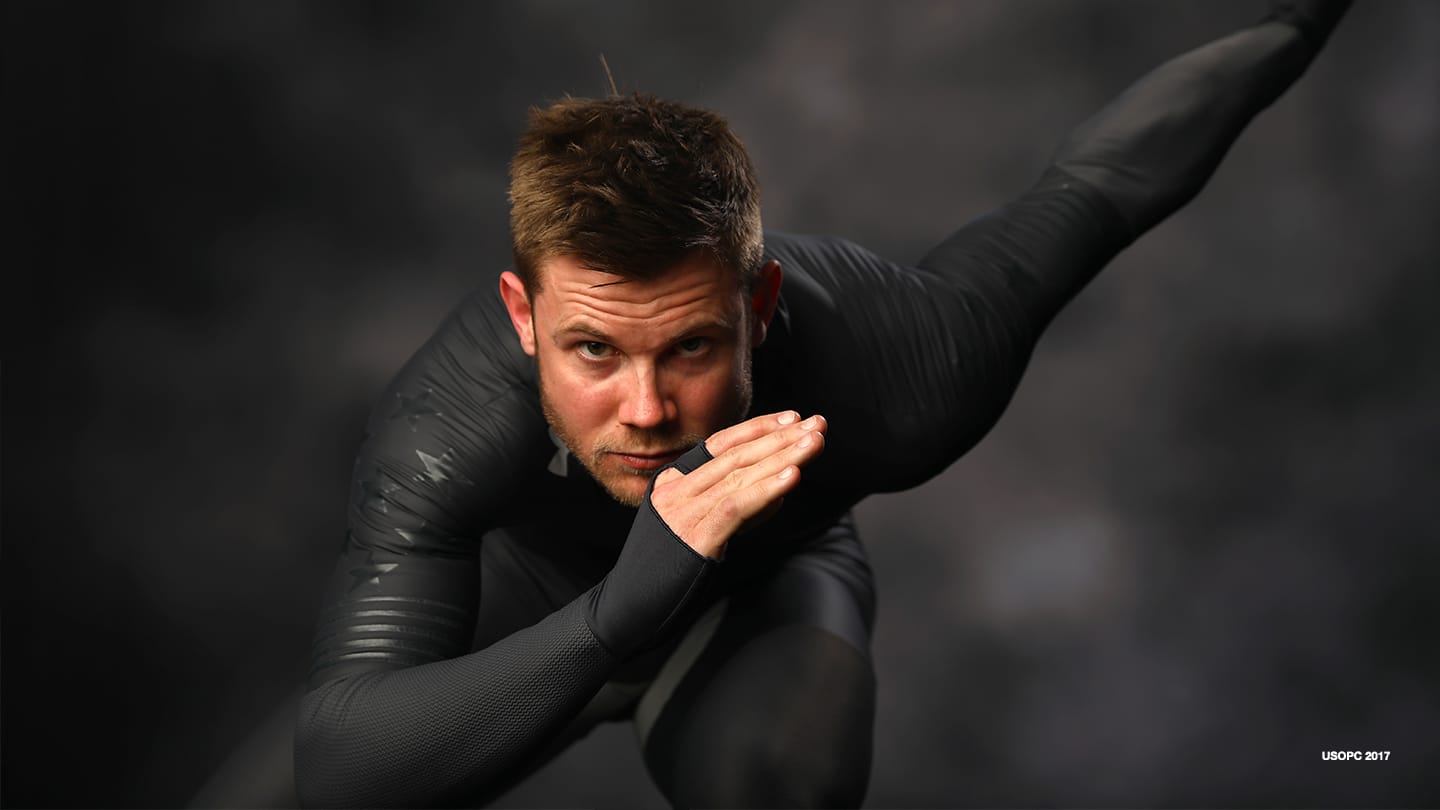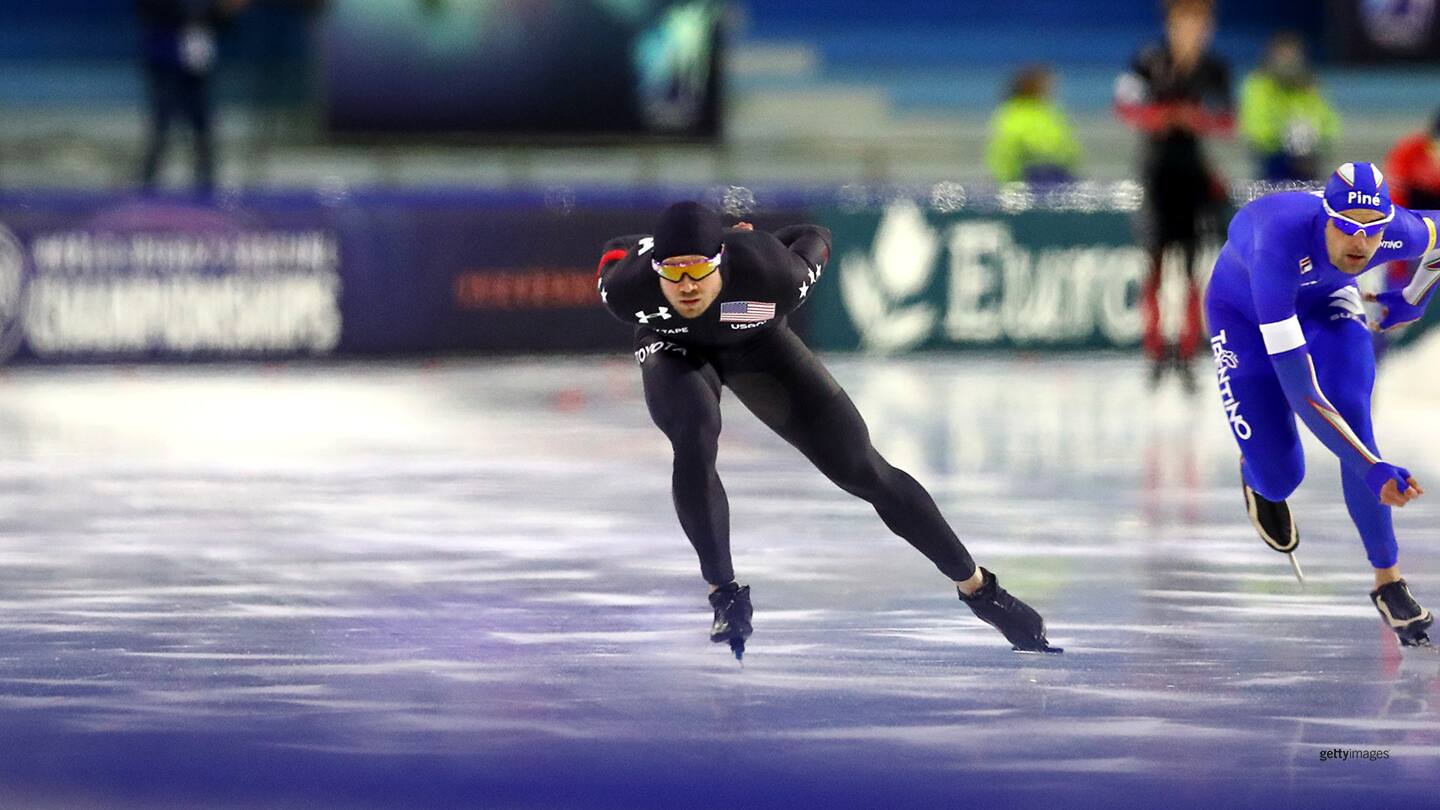
At Age 35, Joey Mantia Pushes For Elusive Speedskating Olympic Medal
by Karen Rosen

Joey Mantia poses for a portrait during the Team USA Media Summit on Sept. 27, 2017 in Park City, Utah.
Joey Mantia is leaving nothing to chance.
Almost as soon as he could step out of his skates last season, he was sitting down at his computer and modifying his entire training program.
Mantia even bought his own starter’s gun to better simulate race conditions.
Everything seems to be clicking, with Mantia on track to make his third straight Olympic team and hopefully win the first medal by a Team USA male speedskater since 2010. He has only one regret.
“I was like, ‘I don’t know why I didn’t do this earlier,’” Mantia said.
Turning 36 on Feb. 7, the day before the men’s 1500 meters at the Olympic Winter Games Beijing 2022, Mantia is a medal hope in that event as well as the mass start and team pursuit. He also expects to race the 1000, the event in which he placed a fourth in PyeongChang 2018 — a result that was both disappointing and motivating.
Mantia said he and U.S. long track speedskating coach Ryan Shimabukuro had a three-year plan going into this Olympics, but Mantia changed it to reflect what he was thinking and feeling.
“I covered every base that I thought I was missing from the previous couple of seasons,” he said. “Luckily, when I handed that program to my coach, he looked over it and said, ‘I agree with everything that’s on there.’”
At the conclusion of the shortened 2020-21 season -- held entirely in a bubble in the Netherlands -- Mantia became the first skater to capture three golds in mass start at the world single distances championships. He also won in 2017 and 2019.
While Mantia said he still feels confident that his best bet for an Olympic medal is the mass start, “the only thing that’s changing now is that I think my chances are even as good in the 1500 and the team pursuit.”
Mantia won both of those events at last weekend’s world cup at the Utah Olympic Oval in Kearns, Utah. The venue for the Salt Lake City Olympics in 2002 is also home ice for the Ocala, Florida, native, who was a 28-time inline world champion before switching to speedskating more than a decade ago.
On Dec. 4, Mantia won the 1500 for his fourth world cup gold in that event, although the first since 2016. He became the oldest man to win a non-distance world cup speedskating race and the oldest American to win any world cup speedskating event.
Despite feeling nervous and a little nauseous before the race – “Maybe I had a little bit too much coffee that morning,” he said – Mantia clocked a personal best of 1 minute, 41.15 seconds. He missed the world record by .98 and Shani Davis’ American record from 2011 by only .11.
“I knew I wasn’t feeling great,” Mantia said, “But there’s no point in focusing on the negatives at that particular point. I just relied on my training because there’s been tons of days at practice where I did not feel great, and I still delivered.”
Following world cup finishes this season of third, second and first in the 1500, Mantia is ranked No. 2 in the world behind Zhongyan Ning of China.
The next world cup is this weekend in Calgary, which also has fast ice at high altitude, so Mantia could have another shot at breaking records. That will depend on the weather, he said, and “if the air pressure is low.”
“I’m not particularly trying to be amazing in Calgary,” Mantia said. “It’s something that I’m kind of training through. Salt Lake was my sweet spot for where I really wanted to perform well.”

Joey Mantia competes in the 1500 meter men's race during the ISU World Speed Skating Championships on Feb. 14, 2021 in Heerenveen, Netherlands.
A day after the 1500, Mantia anchored Team USA to a world record in team pursuit. He led the way for the eight laps followed by Emory Lehman, 25, and Casey Dawson, 21, to finish in 3:34.47. They broke the previous record set by the Netherlands at the 2020 world championships in Utah by .21 seconds.
“He’s really the leader,” Dawson said of Mantia. “We’re the engines in the back…. We’re just like a train going around the track.”
Mantia said his teammates “are pushing me so hard that I can basically just move my feet and I keep the rhythm and keep the speeds up. The magic behind our team pursuit being so successful is that everybody thinks everybody else’s job is the hardest.”
The Men’s Team Pursuit is walking away with GOLD 🥇and new WORLD RECORD!!@jrmantia, @TheEmeryLehman and #CaseyDawson were a part of the three man team to bring home the win for @TeamUSA 🔥#insync #byebyebye pic.twitter.com/MTlmmJcl0n
— US Speedskating (@USSpeedskating) December 5, 2021
With four events in his repertoire, Mantia has to train for a wide range of races with different skating styles.
“Every day that I come into practice, I have a purpose for everything I do,” he said. “There are no throwaway practices. At my age, I feel like the recovery is equally as important, so I believe in training hard and recovering hard.”
The payoff would be the first U.S. men’s medal in long track speedskating since Vancouver, when Team USA took home a gold, two silvers and a bronze — all on the men’s side. The Americans were shut out in 2014, then the only long track medal in 2018 was the women’s bronze in team pursuit.
“I gladly take the responsibility or the challenge on my shoulders,” said Mantia, who in addition to his fourth-place finish in the 1000 in PyeongChang was eighth in the 1500 and ninth in mass start. “I know the expectations are high; they’re high for myself. I feel like at this point I know what I need to do, and I know what the Olympics is going to feel like. I’m excited to get to Beijing and go to work.”
The 1500 is known as the King’s Race because of its mix of speed and endurance. “If you’re not feeling confident in your skating, it’s a race that you’re really afraid of,” Mantia said, “because you’re out there just really hacking away at the ice and struggling, and it hurts like no other.”
Unfortunately, Mantia hasn’t always performed like a king.
“I felt like I’ve always had that capability,” he said. “My first world cup win came in a 1500 meter -- totally unexpected, right before the Sochi Olympics -- and ever since then I’ve kind of been battling with finding comfort and consistency on the ice.”
He won his first world championships medal in a time trial event in the 1500 in 2020 but came down with Covid-19 the next fall. Mantia said he “definitely was bummed last year” and his fifth-place finish at the 2021 worlds wasn’t indicative of his potential.
“I would have a good one here and there, then I would have a bunch of bad ones,” he said of his checkered history with the 1500. “I would make podium here and there, then I would have years where I wouldn’t even be close. So, I finally just took responsibility for my own shortcomings and said, ‘Why am I struggling with this?’”
Hence, Mantia became the man with the plan.
He said he has more of a coach/assistant coach relationship with Shimabukuro than coach/athlete. But he adds, “If he told me I was doing something wrong, I would change it immediately.”
Although Mantia said he had “one of the best starts on the planet when it came to inline skating,” once he moved from wheels to blades he didn’t get off the line as well.
The veteran skater has tried to rectify that this season by practicing his starts more.
“I thought that if I just spent enough time on the ice that I would get good at starting, but that has not been the case,” he said with a laugh. “So, I said, ‘You know what, I’m not going to have any more excuses coming into the Olympic season.’ That’s what really motivated me to write the program.”
And Mantia is not afraid of being unconventional. He said long trackers often shy away from doing too many starts because of the higher risk of injury. As a result of back problems for most his long track career, Mantia makes sure he warms up and cools down correctly to avoid muscular tightness.
And when he tweaked his back doing a start the Wednesday before the last world cup, he knew exactly what to do. Mantia has a contingency plan for everything.
“It wasn’t 100 percent when I raced the 1500 on Saturday,” he said, “but it was good enough.”
“I tried to cut out pretty much every distraction, not only in my program but in everything in life,” Mantia said. “If I can’t reason that it’s going to make me better at the Olympics, then I just don’t do it any more. If I’m sucking in construction dust…and going to practice, it’s just not worth it. I’d rather just have it unfinished for six months and then wait until after the Olympics and finish.”
He hasn’t abandoned his piano playing, though.
“That’s a hobby that’s not detrimental,” he said.
After the Calgary world cup, Mantia will get ready for the 2022 U.S. Olympic Team Trials – Long Track in Milwaukee, Wisconsin, Jan. 5-9.
“My mindset is such that I’m doing everything I can,” he said, “and I’m not going to cut any corners. Nobody wants me to win more than I do at this point.”